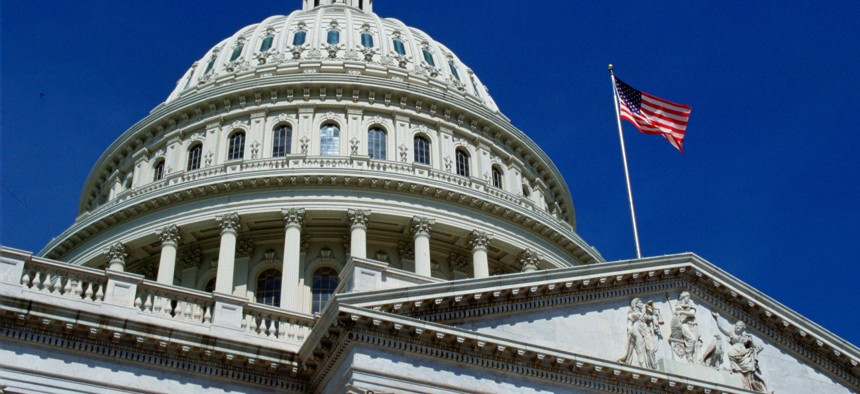Lawmakers are setting a tight schedule to avoid a government shutdown

Lawmakers have until Sept. 30 to avoid a shutdown. Tim Graham / Getty Images
Senate Democrats plan to unveil a bill Wednesday, but will hold off on a vote in an effort to rally support for it.
Congress is teeing up a tight series of votes to fund the government past Sept. 30, with lawmakers giving themselves little time to avoid a shutdown ahead of the looming deadline.
The Senate—which is expected to act first on a short-term stopgap spending bill to fund federal agencies at their current levels for around 10 weeks—will not take up the shutdown-averting bill until just days before current appropriations expire, according to a key negotiator. Sen. Joe Manchin, D-W.Va., who is working with Senate Majority Leader Chuck Schumer on a path to include his measure to reform the permitting process necessary to approve major energy projects, said his office would unveil legislative text on Wednesday and the Senate would vote a week later.
Manchin affirmed the permitting reform would be included with the continuing resolution, as Schumer has stuck to his previous agreement to attach the legislation to the spending bill. Its inclusion could cause complications for avoiding a shutdown, as many Republicans and some progressive Democrats have said they will not vote for the CR as part of that larger package. The more conservative members have said they support the overall intent of permitting reform but prefer their own party’s more aggressive plan, while the more liberal lawmakers have said the changes would undermine important environmental protections.
Still, Manchin insisted the Senate would not separate the provisions. Lawmakers are eyeing a CR that lasts through Dec. 16, though no final decision has been made.
“We’re going to vote and it's going to be in the CR,” Manchin said on Tuesday. “And if they’re willing to say, ‘We’re going to close down the government’ because of a personal attack on me, or basically not looking at the good of the country, this is what makes people sick about politics.”
House Democratic Caucus Chair Rep. Hakeem Jeffries, D-N.Y., said negotiations were ongoing between both parties and chambers to avert a shutdown and that all parties were waiting to see the permitting reform text.
He suggested successful CR votes are “usually brought about by trying to have the cleanest possible continuing resolution while still meeting the needs of the American people when emergencies arise. This mission right now is to make sure that the government doesn’t shut down.”
Manchin said that he would bear no responsibility if the measure fails and the government shuts down.
“I’m not shutting the government down,” he said. “I’m voting for it. Anyone who votes against it is voting to shut the government down.”
If the Senate fails to pass the CR with permitting reforms attached, it could take up a separate, “clean” version of the bill that strips those provisions. And if it does manage to pass the whole package—which remains a possibility, as several Senate Republicans have said they are withholding judgment until they see the text of the bill—the House could opt to remove the Manchin bill and send the spending measure back to the Senate without it.
Rep. Cathy McMorris Rodgers, R-Wash., the top Republican on the House Energy and Commerce Committee, told Punchbowl News on Monday it was “hard to imagine” her or any House Republican supporting a stopgap bill that included the permitting reform and predicted it would not be included in the final version the House passes. If her forecast proves accurate and progressive House Democrats also fail to rally behind it, the measure would be doomed.
House Minority Whip Steve Scalise, R-La., on Tuesday accused Democrats of “flirt[ing] with a government shutdown.”
“Government funding expires on Sept. 30, just a few days away, and Democrats still haven’t filed a bill to stave off a government shutdown,” Scalise said.
Lawmakers are seeking to strike a delicate balance, with many hurdles that could complicate a spending bill vote. Dozens of House Republicans are planning to vote against any CR that expires during the lame-duck session of Congress, arguing Republicans should insist on a measure that lasts into January. That would allow lawmakers to take up a full-year fiscal 2023 appropriations package when Republicans may control one or both chambers of Congress. Former President Trump issued a statement over the weekend imploring his party to take that approach.
The White House, meanwhile, has asked Congress to include $47 billion in emergency funding with the CR, which would go toward Ukraine aid, COVID-19, and monkeypox response, and disaster response. Republicans have expressed little interest in supporting more money for the public health crises, but suggested they could support more Ukraine aid. Democratic leaders have hinted they will not insist on the inclusion of the non-Ukraine portions of the request.
White House Press Secretary Karine Jean-Pierre last week declined to say where President Biden would draw a line in the sand.
“We're going to talk to members of Congress on the Hill,” Jean-Pierre said. “We're going to have conversations. We're going to make it very clear how important it is to make sure the CR gets passed. But I'm not going to get into specifics of what we're going to accept or not accept.”






